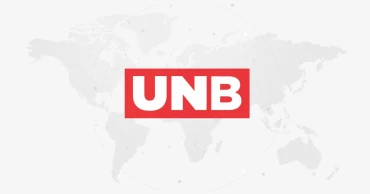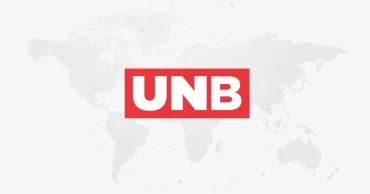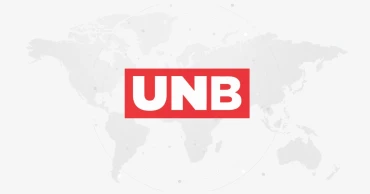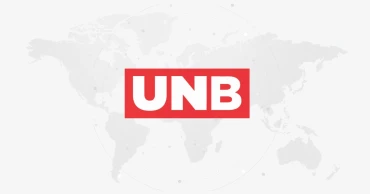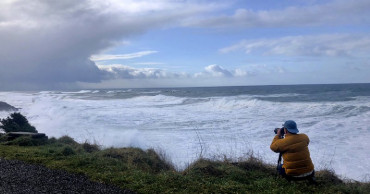ocean
Study warns ocean chemistry changes could weaken sharks’ teeth
Sharks are known as the ocean’s most feared predators, relying on their razor-sharp, constantly regrowing teeth to survive. But scientists say rising ocean acidity could gradually weaken those powerful weapons.
That is the conclusion of a study by German researchers who examined how more acidic seawater affects shark teeth. Scientists say human activities such as burning coal, oil and gas are increasing the amount of carbon dioxide absorbed by the oceans, making seawater more acidic.
The study found that as acidity increases, shark teeth could become structurally weaker and more prone to cracking and breaking. This could eventually threaten sharks’ position at the top of the marine food chain.
“The ocean won’t suddenly be filled with toothless sharks,” said lead researcher Maximilian Baum, a marine biologist at Heinrich Heine University Düsseldorf. “But weaker teeth would be another serious threat for animals already facing pollution, overfishing, climate change and habitat loss.”
Baum said the team discovered clear signs of corrosion on shark teeth, warning that the predators’ ecological dominance could be at risk over time.
The findings were published in the journal Frontiers in Marine Science as concern grows worldwide over ocean acidification. According to the US National Oceanic and Atmospheric Administration (NOAA), acidification happens when oceans absorb more carbon dioxide from the atmosphere. Scientists estimate the ocean could become nearly 10 times more acidic by the year 2300.
For the study, researchers collected more than 600 discarded teeth from an aquarium housing blacktip reef sharks, a species found in the Pacific and Indian oceans. The teeth were placed in water reflecting today’s acidity levels and the projected acidity of the year 2300.
Teeth exposed to the more acidic water showed severe damage, including cracks, holes, root corrosion and overall structural degradation.
Some dogs can learn new words just by eavesdropping
The researchers said the results indicate ocean acidification will have a significant impact on the physical strength of shark teeth.
Shark teeth are highly specialised tools designed for slicing through flesh rather than resisting chemical corrosion. Over a lifetime, a shark can grow and lose thousands of teeth, which are essential for hunting and maintaining balance in marine ecosystems.
Many shark species are already under threat. According to the International Union for Conservation of Nature, more than a third of all shark species face the risk of extinction.
Nick Whitney, a senior scientist at the New England Aquarium who was not involved in the research, said the study was scientifically sound. However, he noted that shark teeth develop inside mouth tissue and may be somewhat protected from changing ocean chemistry for a time.
“Sharks have survived for about 400 million years and have adapted to many environmental changes,” Whitney said.
Gavin Naylor, director of the Florida Program for Shark Research, said ocean acidification is a concern but stressed that overfishing remains the biggest threat to sharks worldwide.
Scientists weigh prospects, hurdles of asteroid mining
Scientists also warn that acidification will affect much more than sharks. Shellfish such as oysters and clams may struggle to build shells, while fish scales could become weaker and more brittle.
Baum said ocean acidification should not be ignored as a growing danger for sharks. Some species are already close to extinction, and worsening ocean chemistry could push them even closer.
“The evolutionary success of sharks depends on their perfectly developed teeth,” he said.
1 month ago
Hasan Mahmud attends "9th Our Ocean Conference" in Greece
Foreign Minister Hasan Mahmud has attended the "9th Our Ocean Conference Greece 2024" held in Athens on April 16-17.
He led a delegation at the Conference which is a regular platform for governments, international organisations, academia, private sectors and NGOs to come together with the aim of sharing a common vision for the protection of oceans and taking actions to support this vision.
The conference was inaugurated by the Greek President through a video message, according to the Ministry of Foreign Affairs.
On the first day, apart from various plenary sessions on greening of the shipping sector, confronting plastic pollution, effective management of marine protected areas, ocean-climate nexus, the foreign minister participated in a high-level segment with the participation of Heads of State/Government, preceded by an event where the Geek Prime Minister delivered the keynote speech.
The foreign minister also took part in a working lunch hosted by the Greek foreign minister in honor of the participating toreign ministers.
9 BNP men land in Naogaon jail
In the morning of 16th April, on the sidelines of the conference, the foreign minister had a bilateral meeting with the Greek Foreign Minister George Gerapetritis.
The ocean plays a key role in human existence; it is essential for people's survival, well-being and prosperity.
It provides food, regulates our climate, and generates most of the oxygen we breathe.
It also serves much of the world’s economy, supporting sectors from tourism to fisheries and to international shipping while it is connected to our culture and is a major source of inspiration.
Number of Benazir-like wealthy people increased: Rizvi
However, the health of seas and the ocean, and of marine ecosystems in particular, is threatened by unsustainable practices such as discharges of wastewater and marine litter, unregulated and unreported fishing, unsustainable shipping and tourism activities, said the speakers.
To mitigate the negative impacts from human interventions and improve the current state of our oceans, it is essential to join efforts on a global scale, they said.
Collaboration among nations, NGOs, private entities, academia, professional groups, civil society organisations and more, is of paramount importance for implementing effective solutions, fostering sustainable practices, and safeguarding the delicate equilibrium of oceans.
Read more: SeaKeepers Society: Making waves in ocean conservation
1 year ago
SeaKeepers Society: Making waves in ocean conservation
The International SeaKeepers Society is a non-profit organization that focuses on ocean conservation and research. They work to promote scientific research, raise awareness about marine issues, and support innovative solutions to address challenges facing the world’s oceans. One of their key initiatives involves engaging the yachting community in oceanographic research, using private vessels as platforms for scientific data collection.
The Bangladesh chapter of the International SeaKeepers Society was recently launched, with Enayetullah Khan, editor-in-chief of United News of Bangladesh (UNB) and managing director of Cosmos Group, named as its president.
Also read: International Seakeepers Society arrives in Bangladesh to work on ocean health
Jay Wade, chairman of International SeaKeepers Society, and Julian Chang, president of SeaKeepers Asia, were in Dhaka to formally make the announcement of the launch of the Bangladesh chapter with Enayetullah Khan as its president on November 8, 2023.
During a one-on-one conversation with UNB, Wade explained how the SeaKeepers Society is essentially harnessing the power of yachts for a good cause, facilitating scientist-led expeditions around the world to gather more knowledge, and making waves in ocean conservation.
“I came into SeaKeepers right around 2003. I had a submersible, a two-person submersible, and we dove all over the world. I was in Monaco, for an event, and that’s where I met the SeaKeepers team. I’m a programmer by trade, and I had a software company. We did a lot of work with big data at the time,” Wade recalled how he joined the organization.
“The way SeaKeepers operate is: An owner would put a device we call the ‘SeaKeeper 1000’ on the yacht, and as they travel around the oceans, it would measure roughly 10 different items of the ocean and a handful of items from the air, package those up, collect that data, and then send it back via satellite to a database in the United States. Then from there, we shared it with scientists. So when I heard that and being somebody who loves the ocean, I thought, ‘wow, that’s a really good idea, and I want to be a part of it.’ That’s when I signed up to become a SeaKeeper,” he said.
Also read: International Seakeepers Society opens Bangladesh chapter with Enayetullah Khan as president
“Over the years, we have changed what we do a little bit. We still enable protection and restoration of the world’s oceans, and we still collect data. But we’ve added several other things to that – education, community involvement, citizen science, and Discovery Yachts. As time has gone on, we’ve been able to grow our fleet and expand our operation,” he added.
Talking about in how many countries they operate, the SeaKeepers Society chairman said, “Our main office is in Miami, Florida. We also have an office on the West Coast of the United States, in Newport Beach, California. Those two offices typically handle all of North and South America. Then we have an office in London, which right now handles Europe. There’s an office in Singapore for Asia, and one in New Zealand, which operates for South Pacific. We will probably add 6 to 10 more offices around the world to facilitate the science and restoration.”
On the significance of the Bay of Bengal and Sundarbans, he said, “Preserving those areas is good for the earth, which ultimately is good for the people. However, you can’t preserve anything unless you take the local communities into account. So, one of the things we’re very cognizant of is that it’s really important to work with local communities for successful preservation. That’s the primary reason we’re here this week.”
“Before this year, we had about 200 yachts involved in the SeaKeepers Society. This year, we’ve added quite a bit more. We’ve added roughly 10,000 boats that are part of owners’ groups for different brands that we work with. It’s going to take several years to get them all on board and get them trained. I’d say in the next three years, we should have 10,000,” Wade said about the size of the fleet.
2 years ago
6th Indian Ocean Conference in Dhaka: Bangladesh, India committed to an 'open, inclusive, rules based' IOR
The Indian Ocean Region (IOR) is no longer an idea based on "power equations", but rather a natural construct based on principles of “inclusivity, comradery, and multi-stakeholderism,” says a document related to the 6th Indian Ocean Conference being held in Dhaka on May 12, 13.
As two responsible states, Bangladesh and India are committed to ensure the rise of a “free, open, inclusive and rules based” IOR, according to the concept note of the conference.
The global order is rapidly evolving, power axis is shifting, and the complacency of the past is making way for greater confidence in future, the document reads.
The IOR has emerged as a microcosm of partnerships, collaborations, bilateral and multilateral dependence.
Also read: Indian Ocean Conference in Dhaka on May 12-13: Myanmar not invited
Mauritius President Prithvirajsing Roopun, minister- and state minister-level delegations from 25 countries including Indian External Affairs Minister S. Jaishankar will attend the conference.
Prime Minister Sheikh Hasina will inaugurate the conference at a Dhaka hotel on May 12. The Prime Minister will also host a dinner in honour of the guests.
The 6th edition of the conference is being organised by India Foundation in association with the Ministry of Foreign Affairs, Government of Bangladesh.
Home to the most promising economies, the most populous lands, and the most vulnerable islands, the Indian Ocean Region is a testimony to the multifaceted challenges impacting governance in the 21st century.
Read More: Bangladesh urges Indian Ocean nations to work together to promote blue economy
With a vast reserve of natural resources and supply chain trade routes, the IOR has become an integral part of global strategic thinking.
From Europe to America and Japan to South Korea, all major powers have aligned their global strategic outreach in line with the vision of developing a Free and Open Indo-Pacific Region (FOIP).
With a vision towards mutual growth, prosperity and strengthening of the international community, the 6th IOC will bring together stakeholder nations to discuss and deliberate on the theme of “Peace, Prosperity, and Partnership” for a resilient future.
In light of recent developments, the global community appreciates the expansion of resilience to go beyond economic strength and military might to include in its ambit the challenges posed by rapid climatic deterioration, and the exponential rise of disruptive technologies.
Read More: Ocean health needs proper regional, global attention: Dhaka
Peace
While the expanse of the IOR makes it a region of infinite potential, it is the same expanse that can lead to damages of unfathomable scale. The region today is faced with not just traditional challenges of security but also non-traditional challenges of biohazards, cyberwarfare, and maritime piracy. The after-effects of such a disruption are unimaginable.
Thus, maintaining peace in the region is of paramount importance to ensure the rise of a resilient future. Rise of a peaceful IOR on the principles of a rules-based order will chart a new agenda for prosperity and greater partnership in the region and beyond.
Prosperity
The IOR is pegged to rise as the most economically prosperous region of the century. It has the economies of scale, mass consumer market, and technical prowess to lead the world into an era of global affluence based on the ethos of sustainable development.
The region is home to 3 of the 5 fastest growing economies of the world, 64% of the global population, and 60% of the global GDP while also accounting for 40% of the world’s oil supply and 64% of oil trade.
Read More: President of Mauritius in Dhaka to attend 6th Indian Ocean Conference, bilateral programmes
As two stakeholder nations of the region, both India and Bangladesh have been traditional advocates of responsible growth and development while living in harmony with nature.
Pushing forth the ethos of a lifestyle based on sustainable development, taking climate conscious decisions ranks high on the prosperity agenda of the IOR.
Partnerships
One lesson that the pandemic taught the world is the importance of collaborative approach to working. Partnerships in the IOR will thus be more forward looking and constructive in their scope.
With greater innovation, ample opportunities are opening up for countries to collaborate in multiple formats on carbon planning and green financing, navigating technological hegemony, the development of the blue economy, the rise of alternate forms of financing, and collaboration on public healthcare and education.
Read More: Maritime cooperation in Indian Ocean increasingly important in current geopolitical landscape: Discussants
Foreign Minister Dr AK Abdul Momen said Bangladesh's partnership with countries in the Indian Ocean will become stronger through hosting the IOC.
External Affairs Minister of India Dr S. Jaishankar will deliver the keynote address of the evening alongside special addresses by the US Deputy Secretary of State, Wendy Sherman, and Vice President of Maldives Faisal Naseem.
The inaugural session will also be graced by the presence of Foreign Minister Dr Momen and Foreign Minister of Oman Sayyid Badr bin Hamad bin Hamood Albusaidi.
The Foreign Minister of Singapore Dr Vivian Balakrishnan will be represented by Dr Maliki Osman, Minister in the Prime Minister's Office and Second Minister of Foreign Affairs of Singapore.
Official delegations led by heads of states/governments, deputy heads, cabinet ministers, deputy ministers and senior officials from 27 countries and multilateral organisations will address the conference on May 13.
Read More: PM to inaugurate Indian Ocean Conference in Dhaka May 12
The Indian Ocean Conference (IOC) was started in 2016 and in the last six years it has emerged as the "flagship consultative forum" for countries in the region on regional affairs.
The conference endeavours to bring critical states and principal maritime partners of the region together on a common platform to deliberate upon the prospects of regional cooperation for Security and Growth for All in the Region (SAGAR).
The first edition of the Indian Ocean Conference was held in Singapore in 2016.
2 years ago
Indian Ocean Conference in Dhaka on May 12-13: Myanmar not invited
Bangladesh's partnership with countries in the Indian Ocean will become stronger through hosting the Indian Ocean Conference (IOC) in Dhaka on May 12-13, Foreign Minister Dr AK Abdul Momen said on Wednesday.
Mauritius President Prithvirajsing Roopun, minister and state minister-level delegation from 25 countries including Indian External Affairs Minister S. Jaishankar will attend the conference.
Briefing reporters at the Ministry of Foreign Affairs, Dr Momen also said around 150 foreign guests will participate in the conference including representatives from D8, SAARC and BIMSTEC.
The participating ministers will also visit Bangabandhu Memorial Museum at Dhanmondi 32 to pay respect to the Father of the Nation Bangabandhu Sheikh Mujibur Rahman.
State Minister for Foreign Affairs Md Shahriar Alam said Bangladesh maintains good relations with Mauritius and the relations will further strengthen through the visit of the country's president.
Responding to a question, Dr Momen said Myanmar was not invited to the conference.
Prime Minister Sheikh Hasina will inaugurate the conference at a Dhaka hotel on May 12. The Prime Minister will also host a dinner in honour of the guests.
The 6th edition of the conference is being organised by India Foundation in association with the Ministry of Foreign Affairs, Government of Bangladesh.
With the theme of “Peace, Prosperity and Partnership for a Resilient Future”, the conference would bring together a luminary gathering of key stakeholders to chart the roadmap for strengthening the Indian Ocean Region.
External Affairs Minister of India Dr S. Jaishankar will deliver the keynote address of the evening alongside special addresses by the Deputy Secretary of State of USA Wendy Sherman and Vice President of Maldives Faisal Naseem.
The inaugural session will also be graced by the presence of Foreign Minister Dr Momen and Foreign Minister of Oman Sayyid Badr bin Hamad bin Hamood Albusaidi.
The Foreign Minister of Singapore (Dr Vivian Balakrishnan) will be represented by Dr Maliki Osman, Minister in the Prime Ministers' Office and Second Minister of Foreign Affairs of Singapore.
Official delegations led by Heads of State/Government, Deputy Heads, Cabinet Ministers, Deputy Ministers and Senior Officials from 27 countries and multilateral organisations will address the conference on May 13.
The conference will also bring together a gathering of over 300 social and corporate leaders, policy practitioners, scholars, professionals and media personnel from over 40 countries.
The Indian Ocean Conference (IOC) was started in 2016 and in the last six years it has emerged as the "flagship consultative forum" for countries in the region on regional affairs.
The conference endeavours to bring critical states and principal maritime partners of the region together on a common platform to deliberate upon the prospects of regional cooperation for Security and Growth for All in the Region (SAGAR).
The first edition of the conference was held in Singapore in 2016.
It was attended by over 300 delegates from 22 countries including ministers, political leaders, diplomats, strategic thinkers, academics, and media.
2 years ago
UN envoy urges all-out effort to turn around deteriorating ocean ecosystem
The international community should make every effort to turn around the deteriorating ocean ecosystem, Peter Thomson, United Nations secretary-general's special envoy for the ocean, said on Wednesday.
6 years ago

